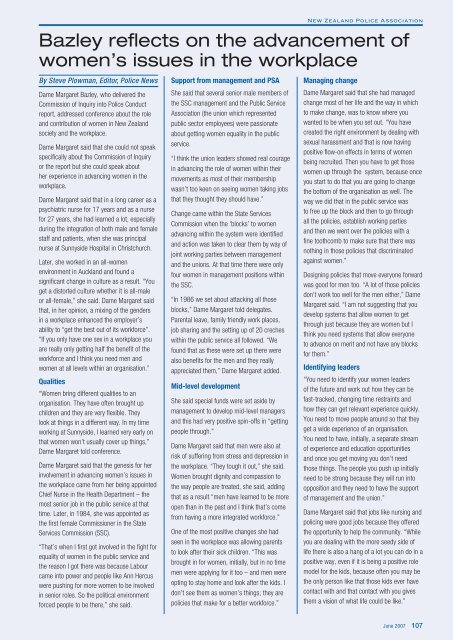Police News June 07.indd - New Zealand Police Association
Police News June 07.indd - New Zealand Police Association
Police News June 07.indd - New Zealand Police Association
You also want an ePaper? Increase the reach of your titles
YUMPU automatically turns print PDFs into web optimized ePapers that Google loves.
<strong>New</strong> <strong>Zealand</strong> <strong>Police</strong> <strong>Association</strong>Bazley reflects on the advancement ofwomen’s issues in the workplaceBy Steve Plowman, Editor, <strong>Police</strong> <strong><strong>New</strong>s</strong>Dame Margaret Bazley, who delivered theCommission of Inquiry into <strong>Police</strong> Conductreport, addressed conference about the roleand contribution of women in <strong>New</strong> <strong>Zealand</strong>society and the workplace.Dame Margaret said that she could not speakspecifically about the Commission of Inquiryor the report but she could speak abouther experience in advancing women in theworkplace.Dame Margaret said that in a long career as apsychiatric nurse for 17 years and as a nursefor 27 years, she had learned a lot, especiallyduring the integration of both male and femalestaff and patients, when she was principalnurse at Sunnyside Hospital in Christchurch.Later, she worked in an all-womenenvironment in Auckland and found asignificant change in culture as a result. “Youget a distorted culture whether it is all-maleor all-female,” she said. Dame Margaret saidthat, in her opinion, a mixing of the gendersin a workplace enhanced the employer’sability to “get the best out of its workforce”.“If you only have one sex in a workplace youare really only getting half the benefit of theworkforce and I think you need men andwomen at all levels within an organisation.”Qualities“Women bring different qualities to anorganisation. They have often brought upchildren and they are very flexible. Theylook at things in a different way. In my timeworking at Sunnyside, I learned very early onthat women won’t usually cover up things,”Dame Margaret told conference.Dame Margaret said that the genesis for herinvolvement in advancing women’s issues inthe workplace came from her being appointedChief Nurse in the Health Department – themost senior job in the public service at thattime. Later, in 1984, she was appointed asthe first female Commissioner in the StateServices Commission (SSC).“That’s when I first got involved in the fight forequality of women in the public service andthe reason I got there was because Labourcame into power and people like Ann Hercuswere pushing for more women to be involvedin senior roles. So the political environmentforced people to be there,” she said.Support from management and PSAShe said that several senior male members ofthe SSC management and the Public Service<strong>Association</strong> (the union which representedpublic sector employees) were passionateabout getting women equality in the publicservice.“I think the union leaders showed real couragein advancing the role of women within theirmovements as most of their membershipwasn’t too keen on seeing women taking jobsthat they thought they should have.”Change came within the State ServicesCommission when the ‘blocks’ to womenadvancing within the system were identifiedand action was taken to clear them by way ofjoint working parties between managementand the unions. At that time there were onlyfour women in management positions withinthe SSC.“In 1986 we set about attacking all thoseblocks,” Dame Margaret told delegates.Parental leave, family friendly work places,job sharing and the setting up of 20 crecheswithin the public service all followed. “Wefound that as these were set up there werealso benefits for the men and they reallyappreciated them,” Dame Margaret added.Mid-level developmentShe said special funds were set aside bymanagement to develop mid-level managersand this had very positive spin-offs in “gettingpeople through.”Dame Margaret said that men were also atrisk of suffering from stress and depression inthe workplace. “They tough it out,” she said.Women brought dignity and compassion tothe way people are treated, she said, addingthat as a result “men have learned to be moreopen than in the past and I think that’s comefrom having a more integrated workforce.”One of the most positive changes she hadseen in the workplace was allowing parentsto look after their sick children. “This wasbrought in for women, initially, but in no timemen were applying for it too – and men wereopting to stay home and look after the kids. Idon’t see them as women’s things; they arepolicies that make for a better workforce.”Managing changeDame Margaret said that she had managedchange most of her life and the way in whichto make change, was to know where youwanted to be when you set out. “You havecreated the right environment by dealing withsexual harassment and that is now havingpositive flow-on effects in terms of womenbeing recruited. Then you have to get thosewomen up through the system, because onceyou start to do that you are going to changethe bottom of the organisation as well. Theway we did that in the public service wasto free up the block and then to go throughall the policies, establish working partiesand then we went over the policies with afine toothcomb to make sure that there wasnothing in those policies that discriminatedagainst women.”Designing policies that move everyone forwardwas good for men too. “A lot of those policiesdon’t work too well for the men either,” DameMargaret said. “I am not suggesting that youdevelop systems that allow women to getthrough just because they are women but Ithink you need systems that allow everyoneto advance on merit and not have any blocksfor them.”Identifying leaders“You need to identify your women leadersof the future and work out how they can befast-tracked, changing time restraints andhow they can get relevant experience quickly.You need to move people around so that theyget a wide experience of an organisation.You need to have, initially, a separate streamof experience and education opportunitiesand once you get moving you don’t needthose things. The people you push up initiallyneed to be strong because they will run intoopposition and they need to have the supportof management and the union.”Dame Margaret said that jobs like nursing andpolicing were good jobs because they offeredthe opportunity to help the community. “Whileyou are dealing with the more seedy side oflife there is also a hang of a lot you can do in apositive way, even if it is being a positive rolemodel for the kids, because often you may bethe only person like that those kids ever havecontact with and that contact with you givesthem a vision of what life could be like.”<strong>June</strong> 2007107
















